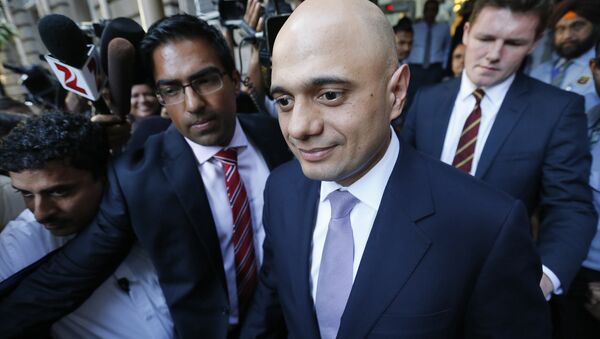UK Home Secretary Sajid Javid gave a speech on Monday, 20 May, spelling out how he plans to use new powers to combat jihadist terrorism.
Speaking in central London, Mr Javid set out for the first time how he intends to use the new Counter-Terrorism and Border Security Act.
So what powers are in the act?
Home Secretary @sajidjavid announces plans for an Espionage Bill with ‘new and modernised’ powers to tackle hostile state activity. He’s looking at updating Official Secrets Act & Treason Laws
— Danny Shaw (@DannyShawBBC) 20 May 2019
Banning Travel
- It gives the Home Secretary the power to ban people from travelling to, or remaining in, certain areas and invidivuals could face up to 10 years in prison if they ignore the ban.
But, like all UK legislation, it cannot be used retrospectively and can therefore not be used against Shamima Begum.
Ms Begum left London to join Daesh* when she was 15. She is currently in a refugee camp, having been refused the right to return to Britain.
Confirmation from @sajidjavid that he’ll look at designating Syria & possibly parts of West Africa as places where Britons will be banned from travelling to and staying in under new counter terror powers
— Danny Shaw (@DannyShawBBC) 20 May 2019
Restricting Opinions
- It makes it an offence to express an opinion or belief that supports a proscribed organisation, such as Daesh or the New IRA.
Criminalising Images
- It criminalises the publication of certain images which would arouse reasonable suspicion the offender was a member or supporter of a proscribed organisation.
Stopping Terrorist Live Streams
- It strengthens the existing offence of downloading terrorist material and extends it to live streaming such material, where this is done at least three times.
Managing Freed Offenders
- It is designed to manage terrorist offenders better following their release from custody.
Beefing Up Police Powers
- It strengthens powers of the police to prevent and investigate terrorist offences.
Referrals From Councils
- It allows local councils to refer people who are considered vulnerable to being drawn into terrorism to multi-agency panels, which assess them and provide support.
77 international terrorist organisations are proscribed in the UK.
— Home Office (@ukhomeoffice) 19 May 2019
Watch the video to find out how proscription helps to disrupt terrorism. pic.twitter.com/QXJ1gbfwN5
Bolstering UK Borders
- It "hardens the UK's defences at the border against hostile state activity", according to the Home Office.
Part 2 of the Bill is was drawn up in response to the poisoning of Sergei and Yulia Skripal in Salisbury on 4 March 2018 with a nerve agent.
Clause 20 and schedule 3 would bring in powers "to stop, question, search and detain people at ports and borders to determine whether they appear to be (or have been) engaged in hostile activity."
*Daesh, the Islamic State of Iraq and the Levant (ISIL), Islamic State of Iraq and Syria (ISIS), Dawlat al-'Iraq al-Islamiyya, Islamic State of Iraq (ISI), the Islamic State in Iraq and Sham, and Dawlat al Islamiya fi Iraq wa al Sham (DAISh), and al-Qaeda are all terrorist organizations which are also banned in Russia and many other countries.


